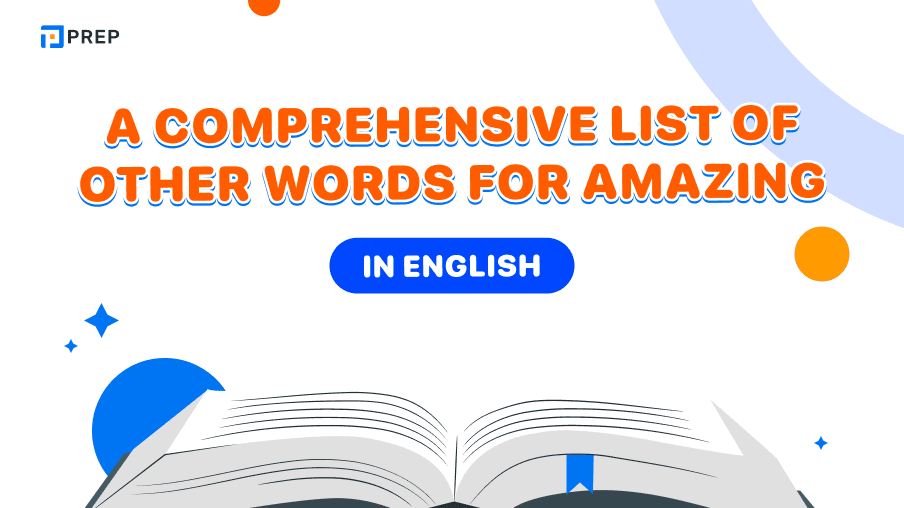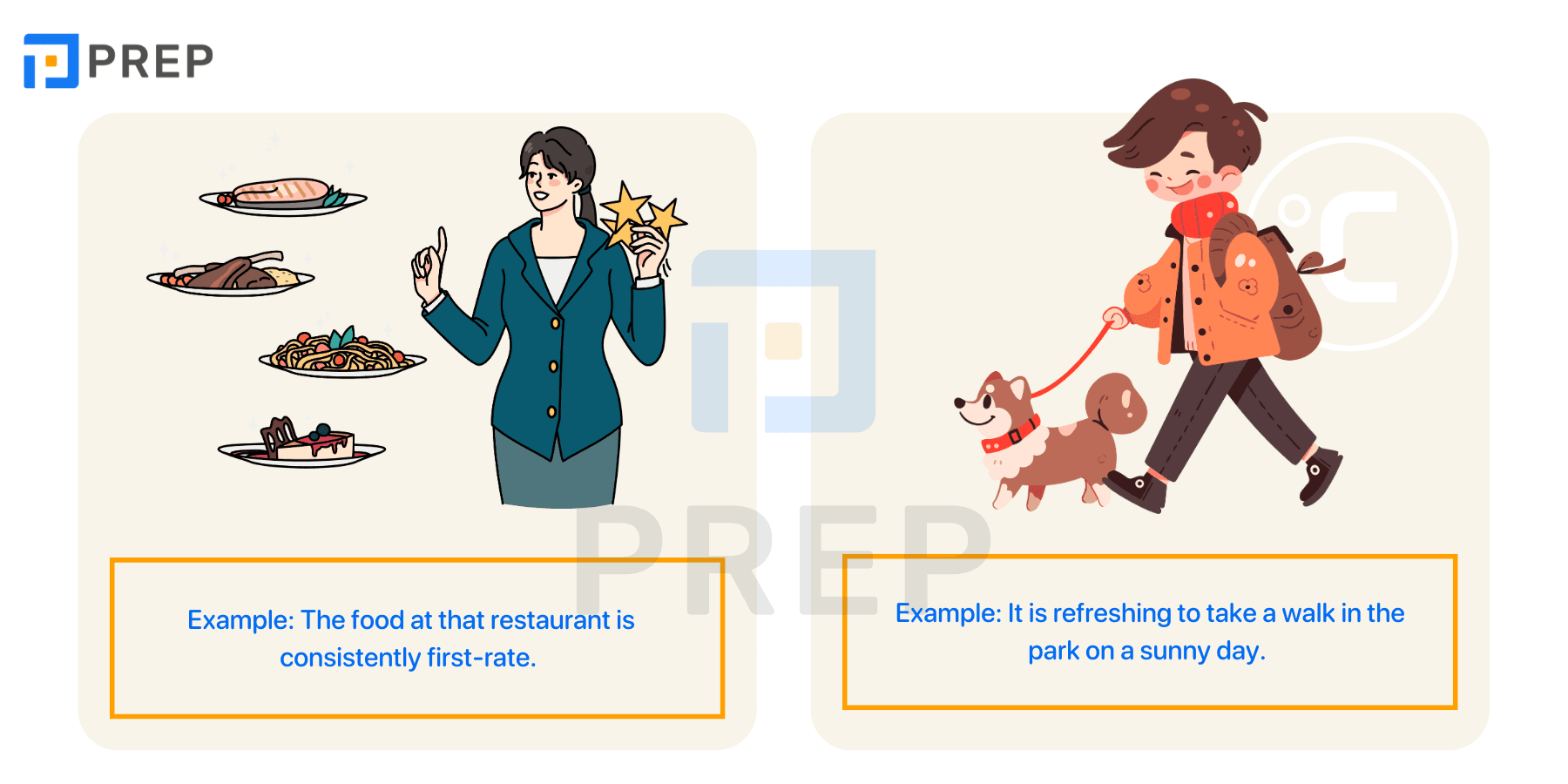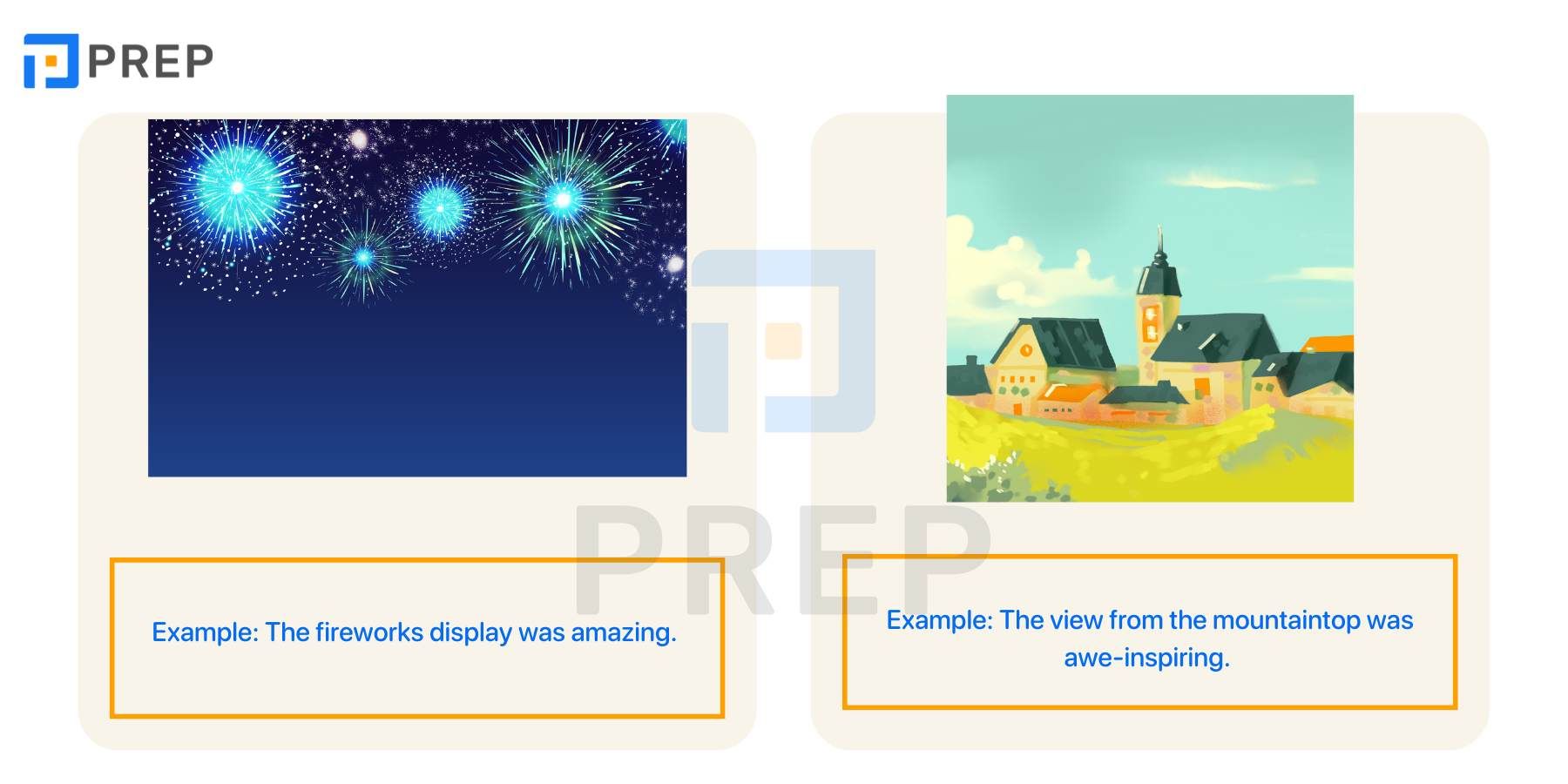Amazing in English: Meaning, Usage, and Examples
“Amazing in English” is a common adjective that describes something impressive or surprising. This article helps you understand its meaning, grammatical usage, and emotional tone. You’ll also find examples, synonyms, and practical tips to use “amazing” naturally in speech and writing.

I. Meaning of Amazing in English
The word Amazing in English means very surprising, impressive, or remarkable in a way that causes strong emotional reaction. It is used to describe something outstanding, wonderful, or hard to believe due to its quality, beauty, or unexpectedness.
“Amazing” is classified as an adjective. It is used to modify nouns, providing more detail about someone or something that creates a sense of admiration, excitement, or awe.
Examples:
- She gave an amazing presentation at the conference.
- That’s an amazing view of the city.
In both examples, “amazing” modifies a noun (presentation, view) and expresses a strong positive impression.
“Amazing” tends to carry a highly positive emotional tone. Native English speakers commonly use it in casual and enthusiastic conversations to respond to good news, express appreciation, or give compliments.
For example:
- “You got the job? That’s amazing!”
- “This cake tastes amazing!”
While “amazing” is widely used in informal contexts, it's also acceptable in semi-formal writing and speaking. However, for academic or professional writing (e.g., IELTS Writing Task 2), you may want to replace it with more formal alternatives such as “impressive”, “remarkable”, or “exceptional” depending on the context.
-
Check out Enrich Your IELTS Vocabulary for advanced word alternatives.
1. How to Use Amazing in English Sentences
To use “amazing” correctly in English, it’s important to understand its sentence structure, typical positions, and how it combines with nouns, verbs, and adverbs for emphasis. “Amazing” functions as an adjective and is usually used to express a strong positive impression about people, objects, experiences, or actions.
Sentence structures with “amazing”
“Amazing” is typically placed:
- Before a noun (attributive position)
Example: She has an amazing voice. - After a linking verb such as be, feel, look, seem (predicative position)
Example: The food was amazing.
You can also use it in exclamatory expressions:
- What an amazing idea!
- Isn’t that amazing?

Describing people, things, and experiences
“Amazing” can be used to describe a wide range of subjects:
- People: She’s an amazing teacher.
- Places: We visited an amazing castle in Spain.
- Experiences: That was an amazing concert.
- Skills or actions: He did an amazing job under pressure.
To make your expression even more emphatic, you can combine “amazing” with intensifying adverbs:
- Really amazing
Example: The view from the top was really amazing. - Absolutely amazing
Example: Her performance was absolutely amazing. - Truly amazing
Example: It was a truly amazing experience.
These combinations are especially helpful in spoken English, social media captions, reviews, or even IELTS Speaking to show expressive vocabulary.
2. Synonyms and Antonyms of Amazing in English
While “amazing” is a widely used adjective to describe something impressive or extraordinary, overusing it can make your language sound repetitive or too casual—especially in formal writing or exams like IELTS. Expanding your vocabulary with synonyms and antonyms will help you express ideas more precisely and naturally.

Common Synonyms of “Amazing”
|
Synonym |
Meaning / Usage |
Example |
|
Awesome |
Informal, very impressive |
That was an awesome performance. |
|
Incredible |
Hard to believe due to greatness or uniqueness |
The technology behind this phone is incredible. |
|
Wonderful |
Pleasant, delightful, emotionally pleasing |
We had a wonderful time at the beach. |
|
Fantastic |
Energetic, fun, surprising |
You’re doing a fantastic job. |
|
Impressive |
Strong effect due to quality, skill, or scale |
Her speech was truly impressive. |
|
Outstanding |
Exceptionally good or noticeable |
He has an outstanding academic record. |
|
Remarkable |
Worthy of attention, unusual in a positive way |
She made a remarkable recovery. |
|
Extraordinary |
Beyond what is normal or expected |
The painting displays extraordinary detail. |
Tip: In informal speaking, “amazing” and “awesome” are often interchangeable. In formal writing, opt for words like impressive, remarkable, or extraordinary.
Antonyms of “Amazing”
To express the opposite of “amazing,” especially when evaluating or contrasting ideas, consider using the following antonyms:
|
Antonym |
Meaning / Usage |
Example |
|
Boring |
Not interesting |
The movie was long and boring. |
|
Ordinary |
Common, not special |
It was just an ordinary meal. |
|
Unimpressive |
Fails to make a strong emotional impact |
The hotel looked nice but the service was unimpressive. |
|
Forgettable |
Not memorable or remarkable |
The concert was fine but entirely forgettable. |
|
Mediocre |
Average or below expectations |
The restaurant received mediocre reviews. |
Using opposites of "amazing" appropriately allows for better contrast and nuance, particularly when expressing criticism, comparison, or mixed reviews.
-
Try learning from 4000 Essential English Words to expand your vocabulary range.
3. Collocations and Phrases with Amazing in English
To sound more fluent and natural in English, it’s essential not only to know the meaning of a word like “amazing” but also to use it in the right collocations and phrases. These combinations are commonly used by native speakers in both conversation and writing.
Common Collocations with “Amazing”
|
Collocation |
Example Sentence |
|
Amazing experience |
It was an amazing experience to travel solo for the first time. |
|
Amazing view |
We had an amazing view of the mountains from our hotel. |
|
Amazing talent |
She has amazing talent for music and art. |
|
Amazing opportunity |
This internship is an amazing opportunity for my career. |
|
Amazing story |
He told us an amazing story about surviving at sea. |
|
Totally amazing |
The performance was totally amazing. |
|
Absolutely amazing |
Your kindness is absolutely amazing. |
|
Really amazing |
The food at that restaurant was really amazing. |
These collocations can be useful in IELTS Speaking Part 2, email writing, storytelling, or travel descriptions.
Idiomatic and Everyday Phrases with “Amazing”
In spoken English, especially in casual or emotional conversations, “amazing” is often embedded in common phrases to respond to good news, show appreciation, or give compliments.
|
Phrase |
Usage |
Example Sentence |
|
That’s amazing! |
Expresses excitement or genuine surprise |
“You passed your exam with a 9.0? That’s amazing!” |
|
You look amazing. |
Compliments someone’s appearance |
“Wow, you look amazing in that dress.” |
|
It feels amazing. |
Describes emotional or physical satisfaction |
“It feels amazing to finally finish this project.” |
|
Sounds amazing. |
Responds positively to a suggestion or plan |
“A weekend by the beach? Sounds amazing!” |
These phrases are especially useful in English conversations, interviews, messages, and storytelling.

II. How to Use Amazing in English Exams Like IELTS or TOEIC
The word “amazing” is simple, expressive, and commonly used in everyday conversation. However, to use it effectively in standardized English tests like IELTS and TOEIC, learners should understand when, how, and where to apply it with maximum impact—especially in Speaking and Writing sections.
Using “Amazing” in IELTS Speaking and Writing
In the IELTS Speaking Test, particularly Part 1 and Part 2, “amazing” is a great choice when describing:
- Personal experiences
Example: “Last summer, I had an amazing trip to Da Nang with my friends.” - Opinions and preferences
Example: “I think Vietnamese street food is amazing—it’s cheap, tasty, and full of flavor.” - Places or events
Example: “The view from the top of the mountain was absolutely amazing.”
Tips for Speaking:
- Combine “amazing” with intensifiers like “really,” “absolutely," or “totally” to show emotion and fluency.
- Replace “nice” or “good” with “amazing” to sound more engaging.
In IELTS Writing Task 2, however, “amazing” should be used carefully—or substituted with more formal alternatives, such as:
|
Instead of “amazing” |
Use |
|
amazing result |
significant result |
|
amazing solution |
effective/innovative solution |
|
amazing improvement |
substantial improvement |
|
amazing achievement |
remarkable achievement |
Learning synonyms for ‘amazing’ helps improve your lexical resource — explore more IELTS Vocabulary by Topics to boost your word choice.
Using “Amazing” in TOEIC Listening and Reading
In the TOEIC Listening Test, you may hear “amazing” used in casual workplace conversations or descriptive situations:
- “That marketing campaign turned out to be amazing in terms of results.”
- “The view from the top-floor lounge is amazing!”
In the TOEIC Reading Test, “amazing” may appear in informal emails, announcements, or ads, often accompanied by synonyms like “great,” “wonderful,” or “exceptional.”
How to prepare:
- Practice identifying “amazing” and paraphrased forms (e.g., incredible, excellent, outstanding).
- Improve scanning skills to match adjectives with context quickly, especially in Part 7 (Reading comprehension).
By mastering how to use and recognize “amazing in English” appropriately in test contexts, learners will not only boost their vocabulary variety but also demonstrate stylistic awareness—something examiners highly value across all skill sections.
The article above has provided you with a comprehensive list of other words for amazing in English, sample sentences, and quotes/idioms related to expressing something amazing. Let’s save this information to effectively study and apply it in real-life communication! Wish you success!

Hi I'm Chloe, and I am currently serving as an Product Content Administrator at Prep Education. With over five years of experience in independent online IELTS study and exam preparation, I am confident in my ability to support learners in achieving their highest possible scores.
Comment
Premium content
View allPersonalized roadmap
Most read












